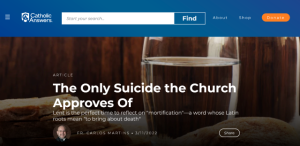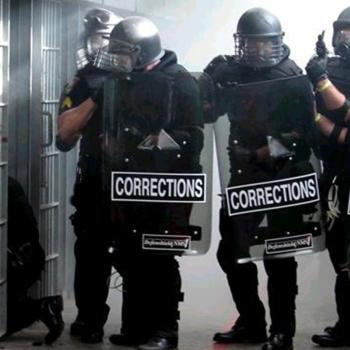 When the rapper Clifford Harris Jr. (also known as T.I.) told the world during a podcast episode aired in November 2019 that he has had his daughter’s physician check her hymen during annual exams, to assure himself his daughter hadn’t been engaging in sexual activity, I was appalled and decided to write about it in my next essay for Catholic Answers’ online magazine. My editor was skeptical about the appropriateness of the topic for a family-oriented web site, but I managed to convince him that an article explaining the Church’s teaching on virginity could be helpful for our clients.
When the rapper Clifford Harris Jr. (also known as T.I.) told the world during a podcast episode aired in November 2019 that he has had his daughter’s physician check her hymen during annual exams, to assure himself his daughter hadn’t been engaging in sexual activity, I was appalled and decided to write about it in my next essay for Catholic Answers’ online magazine. My editor was skeptical about the appropriateness of the topic for a family-oriented web site, but I managed to convince him that an article explaining the Church’s teaching on virginity could be helpful for our clients.
I spent a week researching and writing, then advocating to keep my conclusion that the world treats virginity as a commodity. By the time the article was finished and approved, I was happy with the final result. I hoped it would do some good. A couple of days later, it was published on the web site.
My mouth dropped open in horror when I saw my essay. The editor had chosen to illustrate it with an image of three little girls. I didn’t even have to check Catholic Answers’ Facebook page, where the article had been linked, to guess the reaction. But when I did check, I could see I was right. The combox had blown up with outraged comments by people who were as upset as I was. The editor had probably intended to convey innocence—or possibly to point back to the youth of T.I.’s daughter, the story that had served as a springboard for the topic.
Although certainly not his intention, the actual result appeared to be the sexualization of children.
As soon as I saw the controversy, I ran to the webmaster, convinced him to switch out the image right away for something more appropriate. But the damage had been done. The essay I’d labored over for a week, had hoped would be helpful for readers, never got read. People were too caught up in debating the image selection that they ignored what I wrote about virginity.
I remembered that incident last night. I opened up my email to find a newsletter from Catholic Answers with the title of their latest online essay as the email’s subject line: “The Only Suicide the Church Approves Of.” I picked up my jaw off the floor, then went to the web site. The headline covered an article on Lenten self-mortification by Fr. Carlos Martins. A quick search on the text confirmed my suspicion. Fr. Martins had not used the word suicide in his essay. Whether he suggested the title, I didn’t know, but I did know that during my time at Catholic Answers the editor held final approval over the essay titles.
As expected, the title created a tempest of controversy, one I did what I could to help along by writing an open letter to Catholic Answers’ social media team on my public Facebook page. I wrote:
[To] say that self-mortification is a form of suicide is not unlike the false claim [some people wrongly make] that God committed suicide because Jesus gave himself over to death for the sake of our salvation. We don’t commit “suicide” by dying to self. It’s an acceptance of the cross in emulation of Jesus. And, by the way, treating suicide in such a flippant fashion is, in itself, gravely scandalous.


“Congratulations, Michelle, your work here is done, right?” Well, not quite. Because I still have questions about how the change was made, and whether it was made for the right reasons. And, here, I have to acknowledge that I sympathize to some extent with Catholic Answers because how they handled this snafu mirrored the earlier handling of my essay on virginity—a mess I helped clean up.
I hadn’t chosen the image covering my article, and in my humiliation, I raced to get the image changed out as fast as possible. I have to admit that I wanted the controversy to just go away so that people would read my article and, hopefully, comment about the points I’d made on behalf of the Church’s teaching. When I realized I’d wasted a week’s worth of work on an essay no one read, I was angry.
What I’ve realized in the years since was that the editor’s mistake had sparked a conversation worth having, the frantic clean-up had aborted an apology worth making, and flushing the incident down the memory hole was exactly the wrong approach. What if an apologist, possibly me, since it had been my article, had been dispatched to write an acknowledgement of the controversy, to explain what had happened, and to sincerely apologize for how Catholic Answers had inadvertently underscored my observation that the world treats virginity as a commodity by using an image of three young girls over an article on virginity as clickbait. Not only would there be the possibility of an important subsequent discussion, but some people might even have been inspired to read my original article.
The same thing happened with Fr. Martins’ article on self-mortification. The header has been switched out, embarrassing social media posts have been deleted, the discussion has been hosed down—and I imagine very few people have read Fr. Martins’ article. What if Catholic Answers had asked a staff member to address the controversy, to acknowledge the mistake, and to apologize for trivializing suicide—perhaps including links to suicide prevention web sites to help anyone who might have been triggered to thoughts of self-harm at the mistaken idea that the Church approves of suicide in some circumstances? Perhaps the resulting discussion would have been beneficial, both for staff members and for constituents of the apostolate.
When I first started learning apologetics, I was impressed by Catholic Answers’ insistence that apologists needed to take responsibility for their mistakes. While I faltered in the wake of the controversy over my virginity essay, I mostly tried to acknowledge and correct mistakes I made in my work as a professional apologist. I’d like to believe that doing so helped me to get better at what I did, to take more care before answering questions, and to be more open to critique.
I started out saying I sympathize with Catholic Answers in this instance, and I do. I took no joy in seeing them stumble yesterday. And, despite what Catholic Answers’ COO said to me in a public conversation on Facebook last month (sneering that “it’s a good thing you have Catholic Answers as a foil. What else would you have to talk about?”) I do have other things to talk about (and to think about) than Catholic Answers.
But apologetics played a large part in my life for two decades, it formed much of my spiritual life. Reflecting on the mistakes I made, the things I wish I’d done differently, has been a large part of my process in working through, eventually moving past, that part of my life. And, I hope, is helpful for others too.
If you or a loved one is experiencing thoughts of self harm, please contact your physician or a mental health professional for assistance. Call 911 (in the U.S.) or the National Suicide Prevention Lifeline (1-800-273-8255; suicidepreventionlifeline.org) for immediate help.
(Image: Statue of woman, face in palm of hand; Pixabay. Screenshots from catholic [dot] com.)
















